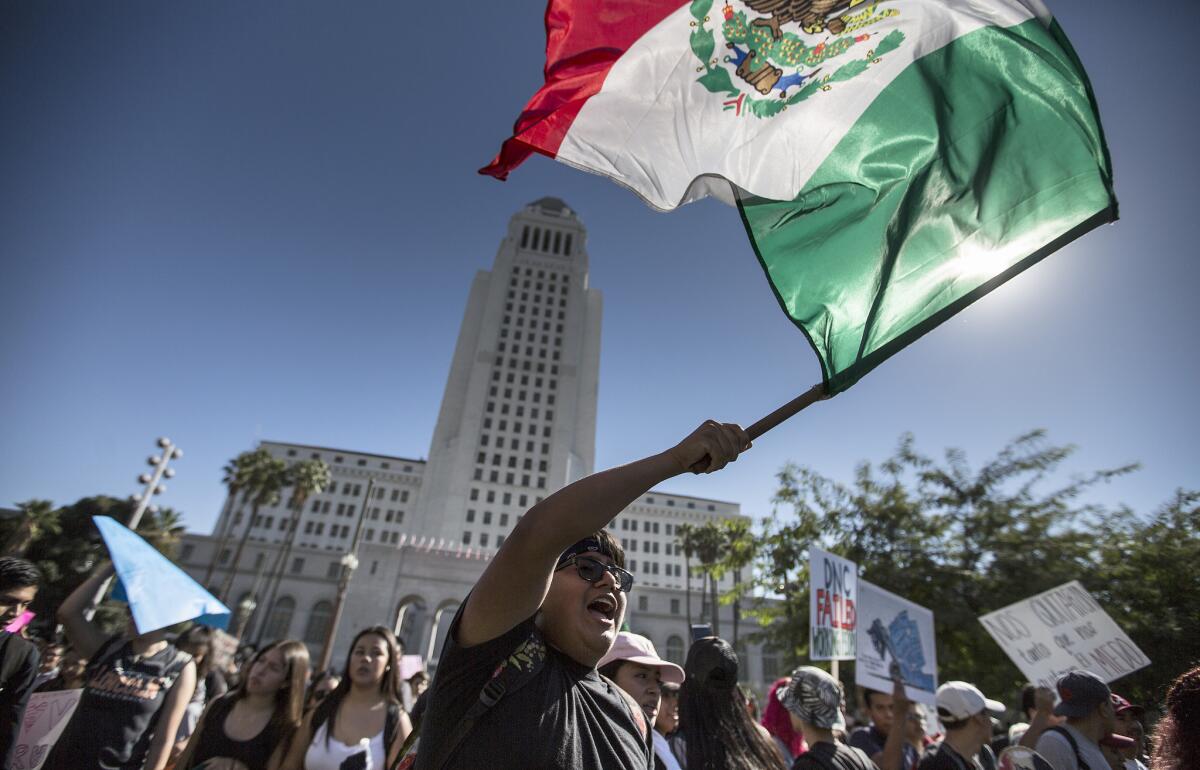Opinion: What will resisting Donald Trump cost California?

- Share via
Good morning. I’m Paul Thornton, The Times’ letters editor, and it is Saturday, Dec. 10, 2016. If you read only one tweet about President-elect Donald Trump’s transition, let it be this one: “If there were a Secretary of Mouse Welfare, Trump would appoint a cat.”
Let’s take a look back at the week in Opinion.
So-called sanctuary cities, those that refuse to use municipal resources to help the federal government deport immigrants, are scrambling to prepare for the start in six weeks of life under a president who promised to deport millions of people in the country illegally. Their worry: that the Trump administration might deny funding to cities that frustrate attempts by federal agents to enforce immigration law.
Some scholars and activists protest that such a punishment would be mean-spirited and possibly even unconstitutional. Not so, say constitutional lawyers David Rivkin and Elizabeth Price Foley in a Times op-ed article — courts would almost certainly allow Trump to financially punish cities in this way. They write:
Feldman and others point to New York v. United States (1992) and Printz v. United States (1997), in which the Supreme Court concluded that the federal government cannot conscript state or local officials to carry out federal law. The federal government must enforce its own laws, using federal personnel. So when state or local police arrest immigrants who are present in the country illegally, they are under no obligation to deport them, as deportation is the responsibility of the federal government alone.
This “anti-commandeering” doctrine, however, doesn’t protect sanctuary cities or public universities — because it doesn’t apply when Congress merely requests information. For example, in Reno v. Condon (2000), the court unanimously rejected an anti-commandeering challenge to the Driver’s Privacy Protection Act, which required states under certain circumstances to disclose some personal details about license holders. The court concluded that, because the DPPA requested information and “did not require state officials to assist in the enforcement of federal statutes,” it was consistent with the New York and Printz cases.
It follows that, consistent with the anti-commandeering doctrine, Congress can require state, local or university police to tell federal agents when they arrest an immigrant present in the country illegally. …
Whatever one’s view of the best immigration policy, it should be uniform. Some, including the Washington Post’s editorial board, have suggested that Congress should give sanctuary cities flexibility to report only those who’ve committed the most serious violent offenses. But precisely which criminals should be subject to deportation requires resolution by Congress, not each city or university.
Sanctuary policies create Balkanization on an issue with important foreign policy implications and corresponding potential for diplomatic embarrassment. As the Supreme Court affirmed in Arizona v. United States (2012), “the removal process is entrusted to the discretion of the Federal Government” because it “touch[es] on foreign relations and must be made with one voice.”
The Constitution is clear that power to determine deportation policies belongs to Congress, not states, municipalities or universities.
California, leader of the resistance to Trump. So says the New York Times’ editorial board, which notes that California and other progressive, immigrant-friendly states and cities “do not have the luxury of waiting and hoping for the best” when it comes to the incoming Trump administration. The New York Times praises California legislators for passing three bills in rapid succession that prepare the state to protect vulnerable immigrants from Trump’s reach. New York Times
Identity politics did in Hillary Clinton, but only because Trump played them. And he played them masterfully, writes Meghan Daum, convincing the nation’s white majority that it was in fact a persecuted minority: “Trump dealt out the victim card to his supporters at every possible opportunity, and they were all too happy to show theirs around like a brand new fake ID.” L.A. Times
Trump went after a labor union leader — just like a true authoritarian would. In attacking the Indianapolis steelworkers union official who criticized him for lying “his ass off” about saving jobs at Carrier Corp., the president-elect wasn’t just letting off steam; he was seeking to crush dissent, writes Steven Greenhouse: “Anyone who believes in robust, pluralistic democracy should be worried that a national leader, so soon after being elected, is assailing labor unions with an eye to weakening them. How else can one interpret Trump’s attack on union dues?” L.A. Times
What Obama still doesn’t get about terrorism: Islamic ideology plays a role. Bryan Dean Wright, a former CIA officer and self-described Democrat, bristles at President Obama’s refusal to make any association at all between the religion of Islam and terrorism, and details the way observers of its growing Salafist strain seek global conquest. “With luck and wisdom, President Trump will fare better,” Wright concludes. L.A. Times
Canada welcomed him as a visitor; the United States dehumanized him when he came home. UCLA law professor Khaled Abou El Fadl, who was returning to the United States after giving a lecture at the University of Alberta, was detained without explanation at Edmonton Airport’s U.S. border preclearance facility. El Fadl, who as a national security lawyer is familiar with the reasons for searches at the border, speculates that nothing other than racial profiling was the cause: “Now I wonder, is there no limit to the alienation and marginalization that American Muslims will be made to feel by their own country?” L.A. Times
Reach me: paul.thornton@latimes.com
Get the L.A. Times Politics newsletter
Deeply reported insights into legislation, politics and policy from Sacramento, Washington and beyond. In your inbox twice per week.
You may occasionally receive promotional content from the Los Angeles Times.








